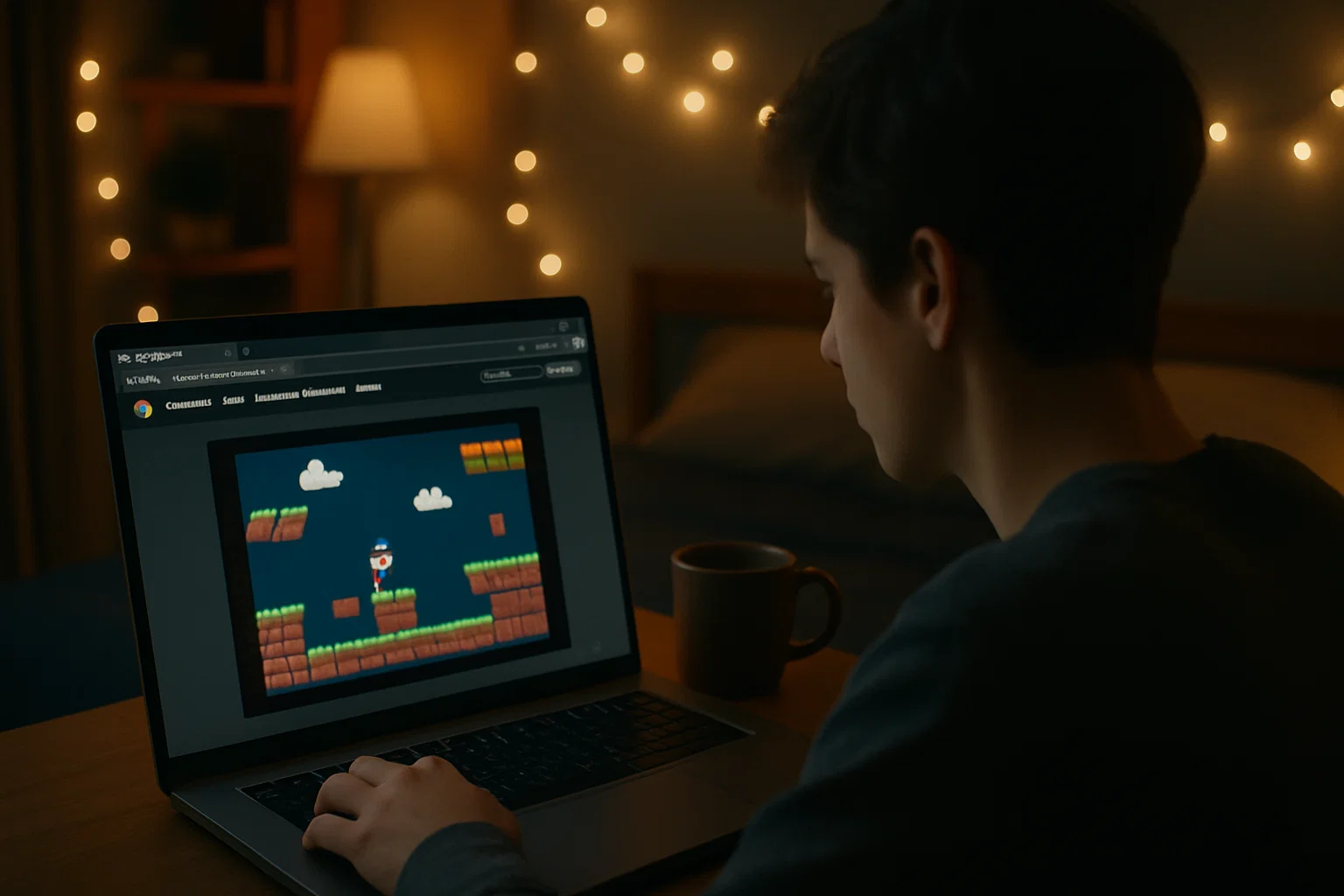Okay, real talk: I’ve developed a new digital obsession. And no, it’s not TikTok dance trends or oddly satisfying slime videos (though let’s be honest—those still hit at 2 a.m.). My latest rabbit hole? GitHub games.
Yep, that GitHub. The same place where coders go to argue about indentation styles and push their projects into the cloud. Turns out, it’s also home to a secret stash of incredible, often bizarre, sometimes brilliant, and always entertaining open-source games—and it’s kind of become my favorite part of the internet.github games
I stumbled into this pixel-filled corner of the web purely by accident and have since wasted… I mean, invested many hours exploring it. So if you’re even a little curious about gaming, coding, or just looking for something fun (and free!) to do on your laptop, you’re in for a treat.
This post is your full backstage pass: how I got hooked, where to find these hidden gems, which ones you must try, and how you can make your own (even if your coding experience stops at “Hello, World!”). Buckle up.github games
What Even Are GitHub Games?
Let’s back it up for a second.
Imagine GitHub as the nerdiest social network ever created. It’s where developers upload their code, collaborate with others, and unleash side projects into the digital wild. Now, among all the serious tools and frameworks live a surprising number of games—from passion projects and programming experiments to full-fledged indie bangers.github games
These games are:
- Mostly free
- Often playable right in your browser
- Frequently weird (in the best way)
- Made with love, caffeine, and maybe a bit of JavaScript rage
Some are clones of old classics, like Tetris or Snake. Others are super original concepts dreamed up in a 48-hour coding frenzy. And because they’re open-source, you can often see exactly how they were made, tweak the code, and make your own remix. That, my friend, is where the real magic lives.
How I Fell Into the GitHub Game Vortex
It started innocently enough.
I was dabbling with JavaScript (read: googling everything) and figured building a tiny game would be more fun than another todo app. While searching for code examples, I stumbled onto a GitHub repo for a Pong clone. I forked it. I played it. I tweaked the speed. I made it rainbow-colored. And just like that, I was hooked.github games
Soon, I was knee-deep in terminal-based shooters, ASCII dungeon crawlers, and experimental WebGL projects that melted my laptop’s soul. It wasn’t just about playing the games—it was about understanding them, breaking them, and occasionally making them better.github games

Where to Find GitHub Games Without Losing Your Sanity
Here’s the thing: GitHub isn’t built for discovery. It’s not like Steam or Itch.io with nice filters and thumbnails. It’s more like wandering through a library where all the books are unlabeled and written by robots. But I got you.
1. GitHub Trending
This is the best place to find what’s hot right now. Head to GitHub Trending, filter by language (try JavaScript or Python), and search for keywords like “game” or “game-dev.” You’ll uncover everything from Mario clones to AI chess bots.github games
I once found a full version of Doom that runs in your terminal. I’m still recovering.
2. Curated Lists (a.k.a. Nerdy Goldmines)
Some generous souls maintain curated lists of GitHub games so you don’t have to dig. Two favorites:
- leereilly/games: The OG list. Think of it as the ultimate buffet of browser games, emulators, and wild experiments.
- awesome-gamedev: More dev-focused but packed with tools and examples.
3. Reddit and Indie Dev Forums
Reddit communities like r/gamedev and r/webdev are full of gems. Developers often post their creations there, complete with juicy dev logs and screenshots. Sometimes they even ask for feedback—your moment to shine!
My Favorite GitHub Games (So Far)
Look, I’ve played a lot. Like, enough that my browser history looks like a digital arcade. Here are a few standouts:github games
2048 by Gabriele Cirulli
You know this one. Slide the tiles. Merge the numbers. Rage-quit when you’re one move from 2048. It’s the perfect blend of simplicity and addiction.
Hextris
Tetris, but with a twist—literally. The pieces rotate around a hexagon, and the speed ramps up fast. It’s clean, it’s pretty, and it scratches that “just one more try” itch.
PlayCanvas 3D Demos
These are actual 3D games that run in your browser. I repeat: no downloads. Some of them look console-quality. Check out their GitHub or official demos—mind-blowing stuff.
Dungeon Crawl Stone Soup
Hardcore, unforgiving, totally text-based. You die a lot. You learn a lot. You maybe cry a little. But if you love roguelikes and ASCII art, this is your jam.
Special Mention: The Genius of js13kGames
One of the coolest parts of GitHub gaming is the annual js13kGames competition. The challenge? Build a full browser game in 13 kilobytes or less. For context, that’s smaller than most memes.
Some mind-bending entries include:
- Evil Glitch: Retro shooter + vaporwave = chef’s kiss
- Backspace: A typing game with a narrative twist
- Tunnel Trouble: Tiny futuristic racer with big vibes
The creativity is off the charts. And since most entries are hosted on GitHub, it’s another perfect gateway into the scene.

How to Actually Play GitHub Games Without Headaches
Okay, so not all GitHub games are “click and go.” Some are polished. Others are… more like IKEA furniture. Here’s how to navigate it:
Browser-Based Games
These are the best for casual players. Look for GitHub Pages links, usually in the README. If the game has an index.html file, you can often just download the repo and double-click it.
Downloadables (Unity, Godot, etc.)
Some projects include downloadable builds in the “Releases” tab. You’ll see .exe, .zip, or .app files. Extract, run, and play.
Command Line Games (a.k.a. Nerd Mode)
These are for the brave. You’ll need to:
- Clone the repo
- Run commands like
npm installorpython main.py - Hope for the best
But hey, it’s a fun way to learn stuff—just don’t try this five minutes before a Zoom meeting.
Want to Make Your Own GitHub Game? Here’s How to Start
Making a game sounds intimidating, but hear me out—it doesn’t have to be. In fact, GitHub is the perfect place to start if you’re curious, creative, and not afraid to break stuff.
Beginner-Friendly Tools:
- p5.js – Artsy, visual, perfect for tiny interactive toys
- Phaser – The go-to framework for 2D games like platformers and puzzles
- Godot Engine – Full-blown game engine, totally free, and supports web exports
Start with a basic idea—pong, snake, whatever. Push your code to a GitHub repo, set up GitHub Pages, and boom: you’ve just published a game on the internet. Cue the confetti.
The Real Magic: Seeing How the Sausage Is Made
Playing these games is fun, sure. But the real treasure? Reading the code.
You get to see how people solve problems, structure projects, and implement mechanics. It’s like getting a free masterclass from a hundred indie devs.
Sometimes I open a repo and learn something cool in five seconds. Sometimes I stare at a physics engine for an hour wondering if math is even real. Either way, it’s a wildly educational ride.
Caution: May Cause Serious Productivity Los
Let me be brutally honest: GitHub games are dangerously fun.
What starts as a “quick break” often turns into a two-hour browser tab deep-dive. One time I meant to write an email and ended up playing a pixelated gardening sim built in React. Oops.
My advice? Schedule your explorations like snack breaks. Treat it like a creative coffee break, not a full-on escape room (unless it’s Saturday, in which case, go wild).
Final Thoughts: GitHub Games Are the Internet’s Secret Playground
GitHub games are weird. They’re niche. They’re raw. But they’re also joyful, personal, and full of that DIY spirit the internet used to be famous for.
Whether you want to play some funky little browser games, learn to code, or just see what passionate people can create when nobody’s watching—this is the playground you didn’t know you needed.
So next time you’ve got 15 minutes and a curious mind, dive in. Who knows? You might discover your new favorite game… or end up building it yourself.
And if you do?
Send me a link. I’ll totally play it “for research.”
i am also author of qualityinfo, buzzcraze
